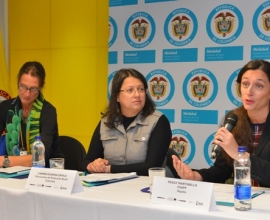Colombia implements a pilot programmed aimed at rational use of medicines
A policy for medicines that strengthens the system and improves transparency to promote responsible prescription of medicines
During the first public act of the Deputy Minister of Social Protection (E), Carmen Eugenia Dávila Guerrero, with the European Union's EUROsociAL programme, the Inter-American Development Bank (IDB), the French Cooperation Agency, and the Panamerican Health Organisation, among others, she highlighted the pilot project on rational use of medicines carried out by the Ministry of Health and Social Protection within the framework of the public policy that is to govern the health sector in Colombia.
Dávila Guerrero emphasised that achieving the participation of these institutions in the Cooperation Partnership for the National Programme for Rational Use of Medicines and Transparency in the Pharmaceutical Sector was key for meeting the goals that were set.
“This proposal on rational use of medicines is key for health spending because it uses European experiences, such as that of the Spanish Autonomous Communities of Madrid and Navarra, and has been successfully applied in hospitals in Cundinamarca”, she indicated.
She explained that the pilot project focused on drugs for high blood pressure “and we are looking to expand it to other groups of drugs so that the initiative strengthens responsible and informed prescribing practices”, she said.
She also centred her intervention on stating that “expensive drugs have a high impact and their management will be more complex, hence the effort to raise awareness of prudent and reasoned use of medicines among stakeholders in the sector and the community. This awareness requires time, information and commitment. We have the challenge of achieving cultural changes in the way medicines are used”, she indicated.
The Deputy Minister concluded by stating that “the Ministry will continue coordinating actions for rational use of medicines—which must be associated with definition of the benefits plan—so that it is taken into account in the updating process with the IETS, IPS, EPS and the medical community to increase trust in how the system works”.
She emphasised that this strategy is also part of the culture of transparency and certainly will bring greater benefits to the population in general.
For her part, Peggy Martinello, EUROsociAL representative, indicated that the impact of the social cohesion measure “is a symbol that depends on public action and on policies that are implemented for access to all services and to reduce inequity and improve equal opportunity through peer-to-peer learning”.
Along these lines, she was clear in asserting that in the health sector “inequity is one of the priorities of all Latin American health systems, and thus a decision was made to work on rational use of medicines. In this sense, the strategy Colombia has implemented is extremely wise”.
The example of Colombia will be taken into account by other systems in the region, and Colombia will be a knowledge transferring country for El Salvador because the leadership of the Ministry puts cooperation in a prominent position.
The implementation of this initiative integrates the technical cooperation of various national stakeholders such as the Drug Information Centre of the National University of Colombia (CIMUN), the Institute for Evaluation of Technology in Health (IETS), the Cochrane Sexually Transmitted Infections Group (CSTIG), the Health Economy Group of the Department of Economic Sciences of the University of Antioquia, among others.
MINSALUD Colombia

